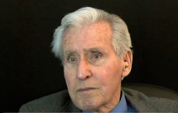1:28 | Arnold Whittaker describes the dichotomy between anonymous replacements and bonded soldiers.
Keywords : replacement casualties friend

Arnold Whittaker remembers a particularly traumatic sight after landing at Omaha Beach a few months after D-Day in 1944.
Arnold Whittaker describes the dichotomy between anonymous replacements and bonded soldiers.
While fighting their way through Europe during World War II, Arnold Whittaker describes how the living conditions temporarily but drastically changed after taking the city of Metz, France, in 1944.
Arnold Whittaker recalls the biggest problem that his unit faced while liberating European cities during World War II.
After liberating Metz and being struck by a German counterattack, Arnold Whittaker recalls the massive numbers of replacement soldiers sent in to his company, and the dangers those inexperienced soldiers posed to their seasoned peers.
Arnold Whittaker describes the deadly winter conditions that G.I.s faced during the Battle of the Bulge and the toll those conditions took on their bodies.
Arnold Whittaker remembers the best Christmas present he ever received during the Battle of the Bulge.
Arnold Whittaker tells the story that ensued after finding a photo of a U.S. soldier in a small Luxembourg village while heading towards Germany in 1945.
Arnold Whittaker discusses how G.I.s each suffered from one of three "orientations" - food, drink or women - and how that played a role when his unit took over a chateau from German troops in 1945.
Arnold Whittaker discusses the hardship U.S. forces faced while crossing the Rhine river in March of 1945 under the command of General Patton.
Only a few days before the war with Germany was rumored to end, Arnold Whittaker recalls finding himself in the sights of a German Tiger tank.
Arnold Whittaker recollects the difficulty, both emotionally and physically, of dealing with fallen soldiers during the Battle of the Bulge.
Arnold Whittaker talks about a time he single-handedly captured over a dozen German soldiers, an action for which he received a Silver Star.
Arnold Whittaker describes the last words he often heard from dying soldiers.